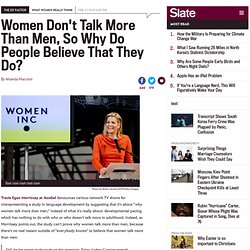

AN OVERVIEW OF WORK ON GENDER AND LANGUAGE VARIATION « i love english language. I.

Early statements on gender and language It is common to assume that the investigation and identification of differences between men’s and women’s speech dates only from the 1970s. While the number of books and articles has certainly expanded our knowledge enormously of this once largely unrecognised area of language usage many articles covering gender and its relation to language usage had appeared many years before. Even in the Tudor period comments about the kind of language that was suitable for young women to aim at is evidenced. Vives (1523) De Institutione Christianae Feminae (On The Instruction of a Christian Woman) has observations on what appropriate was considered then appropriate language for the time. 4.3 Gender & Interaction Theory – Holmes, Tannen, Cameron & DeFrancisco « i love english language.
Compliments attend to the hearer’s: InterestsWantsNeedsGoods This is the first positive politeness strategy identified by BROWN AND LEVINSON.

Holmes definition, 1986: “A compliment is a speech act which explicitly or implicitly attributes credit to someone other than the speaker, usually the person addressed, for some ‘good’ (possession, characteristic, skill, etc.) which is positively valued by the speaker and the hearer” A direct compliment addresses the listener directly and blatantly: “You’re looking good today, Pam” An indirect compliment is inferable from the discourse context: “Is that a new suit?” It is interesting to note that many indirect compliments stem from things that are new, as these are generally highly valued in the consumerist Western societies.
Usually intended to make others feel good- WIERZBICKAServe to increase or consolidate the solidarity between the speaker and addressee- WOLFSO, HOLMES, HERBERT‘Social lubricants’ which create/maintain rapport- WOLFSON N.B. The third extract from Deborah Cameron's new book that argues that the 'Martians' and 'Venusians' are more similar than they think. Men And Women's Differences Aren't Actually Distinct, Confirms Study. Finally science has produce evidence that supports what we already knew -- the whole "men are from Mars, women are from Venus" trope is false.

According to a new study from the University of Rochester, men and women don't have such distinct psychological characteristics after all. The researchers, Harry Reis, a professor of psychology at University of Rochester, and Bobbi Carothers, senior data analyst for the Center for Public Health System Science at Washington University in St. Louis, concluded that characteristics that we traditionally associate with one sex or the other actually exist on a continuum. "Although gender differences on average are not under dispute, the idea of consistently and inflexibly gender-typed individuals is," they wrote. "That is, there are not two distinct genders, but instead there are linear gradations of variables associated with sex, such as masculinity or intimacy, all of which are continuous.
" The visual below demonstrates this pattern. Men and women: are we really worlds apart? - Features. Do women and men talk differently?

And, if they do, why? Kitty Sadler explores the theories Kitty Sadler, 13 March 2011. Deborah Cameron on the supposed miscommunication between men and women. John Gray's Men Are From Mars, Women Are From Venus contains a chapter entitled Speaking Different Languages.

In it, Gray says that the "original" Martians and Venusians communicated without difficulty, because they knew their languages were mutually incomprehensible. Do You Speak American . What Speech Do We Like Best? . Prejudice . Women. Women Talk Too Much No, they don’t.

Rather, they don’t in every situation. Social context and relative power determine who talks more, men or women. Janet Holmes sets the record straight and establishes the reasons for the lingering myth of female chattiness. (The research cited in this essay was first published in 1999.) Study: Men Talk Just as Much as Women. Why-do-women-talk-more-than-men. Scientists have discovered that women talk more than men - and it's all down to the levels of a 'language protein' in our brains.

Researchers at the University of Maryland School of Medicine found a chemical called 'Foxp2' was responsible for the fact the average women speaks 20,000 words a day, 13,000 more than the average man. The protein plays an important part in language development and women have more of it in their brains. For the study, published in The Journal of Neuroscience, the scientists tested baby rats as in sex difference in Foxp2 levels is reversed in the animals.
Men chat more than women do - but when girls talk, it's worth listening to! By Fiona Macrae Updated: 08:16 GMT, 18 February 2011 It might leave the man in your life lost for words – if, that is, you can stop him talking long enough to tell him.

Contrary to popular belief, men talk more than women, research has found. But when women do speak, it’s worth listening – because they use more varied and thoughtful language than men. Men Talk More Than Women. Women may have a reputation as the chattier gender, but research into the matter shows that men may actually be a little more talkative than women—though it all depends on the situation.

Psychologist Campbell Leaper of the University of California Santa Cruz conducted a review of research into the topic spanning from the 1960s to today and which is detailed in the November issue of the journal Personality and Social Psychology Review. The studies Leaper examined looked at talkativeness and different types of speech under a range of social situations and comparing mixed-gender and same-gender conversations. One clear point that emerged from all the studies was that the type of activity people were engaged in influenced how much they talked.
"So even though on the average we're finding a slight trend toward men being more talkative than women, we found larger differences when you looked at particular situations," Leaper said. These differences have actually declined with time though. Do women talk more? The answer is no, but the belief persists despite the evidence.
Photo by Robin Utrecht/AFP/Getty Images Tracie Egan Morrissey at Jezebel denounces various network TV shows for misrepresenting a study in language development by suggesting that it's about "why women talk more than men," instead of what it's really about: developmental pacing, which has nothing to do with who or who doesn't talk more in adulthood.

Indeed, as Morrissey points out, the study can't prove why women talk more than men, because there's no real reason outside of "everybody knows" to believe that women talk more than men: Still, for her report on the study on this morning's Today, Andrea Canning opened with an oft referenced statistic that women talk three times as much as men, using 20,000 words a day compared to men's 7,000 words a day.
How do women fare in parliament? In 2006, Tony Blair told the House of Commons that the next election would be a contest between "a heavyweight and a flyweight". He predicted that his successor, Gordon Brown, would knock out the Conservative leader, David Cameron, with a "big, clunking fist". These remarks delighted the Cameron camp while appalling many on Blair's own side. Labour supporters feared for their electoral prospects if voters got the idea that, as one journalist put it, "Gordon Brown is from Mars, David Cameron is from Venus". Today it is a truism that effective leaders do not use "big, clunking fists": in the words of the management guru Tom Peters, they "listen, motivate, support".
They wear their authority lightly and are not afraid to show their feelings. Agreement in the House of Lords? Not likely! A vintage engraving from 1861 showing tumult in the House of Lords Anyone who has watched Question Time in either the House of Commons or the House of Lords of the British Parliament will know that there is a certain kind of institutional rudeness which is acceptable as part of the ritualized confrontational encounters that take place there.
Could language have something to do with the glass ceiling? Much research has been carried out on male and female roles in business. While it’s a consistent finding that there are fewer women in management positions, there seems to be less consistency in the type of language styles and strategies employed by each gender. For example, it has been proposed that females are associated with indirect, conciliatory styles which incorporate supportive feedback in their structure. On the other hand, males tend to be linked with direct, confrontational styles and their discourse will feature more aggressive interruptions. However, Hans Ladegaard’s research found that reality is a lot more complex than this. Men, women and leadership language. Why are there still a minority of women in executive roles? Do women make less of a linguistic impact in the boardroom than men? Is this one reason why there continues to be a lack of women who succeed at executive level?
These are questions that researcher Judith Baxter set out to explore in her analysis of data from senior management meetings and follow-up interviews in seven multinational companies. In her article, Baxter reminds us that men are still at the top when it comes to ‘the most powerful roles in most national and multinational companies, not just in Britain but worldwide’ and that women are rarely found in the top positions in boardrooms. Of course there are many reasons why this is the case but Baxter argues that little attention has been given to possible linguistic explanations, an oversight that she aims to redress in her research, which explores whether the use of leadership language is a possible reason why women are not reaching the highest positions in business.
When, how and why do gender differences in language begin? Could children’s segregated friendship groups account for the development of gender differences in language use? YouTube. Julia Gillard speech prompts dictionary to change 'misogyny' definition. When Australian prime minister Julia Gillard launched a ferocious attack on the leader of the opposition for his repeated use of sexist language, she was feted by feminists the world over. But critics in Australia rounded on her for supposedly misusing the word misogyny and falsely accusing Tony Abbott of hating women. Sexism and misogyny: what's the difference? Do men and women speak the same language?
Giving directions: do women do this differently to men? Sugar and spice? What compliments reveal about women’s and men’s cultural values. Mars and Venus? Men and Women Use Uptalk Differently: A Study of Jeopardy! We’re celebrating the end of the year with our most popular posts from 2013, plus a few of our favorites tossed in. Mumbling is macho. Men who pronounce their words less distinctly are perceived as more macho, or so the research of Kevin Heffernan suggests. Many previous studies have found a gender difference in how we articulate our words, with men tending to articulate less precisely than women.
How insults can shape identity. Insults can create a feeling of belonging and shared identity - hey fat emo, what’s going on? Sexism and Genderlect.